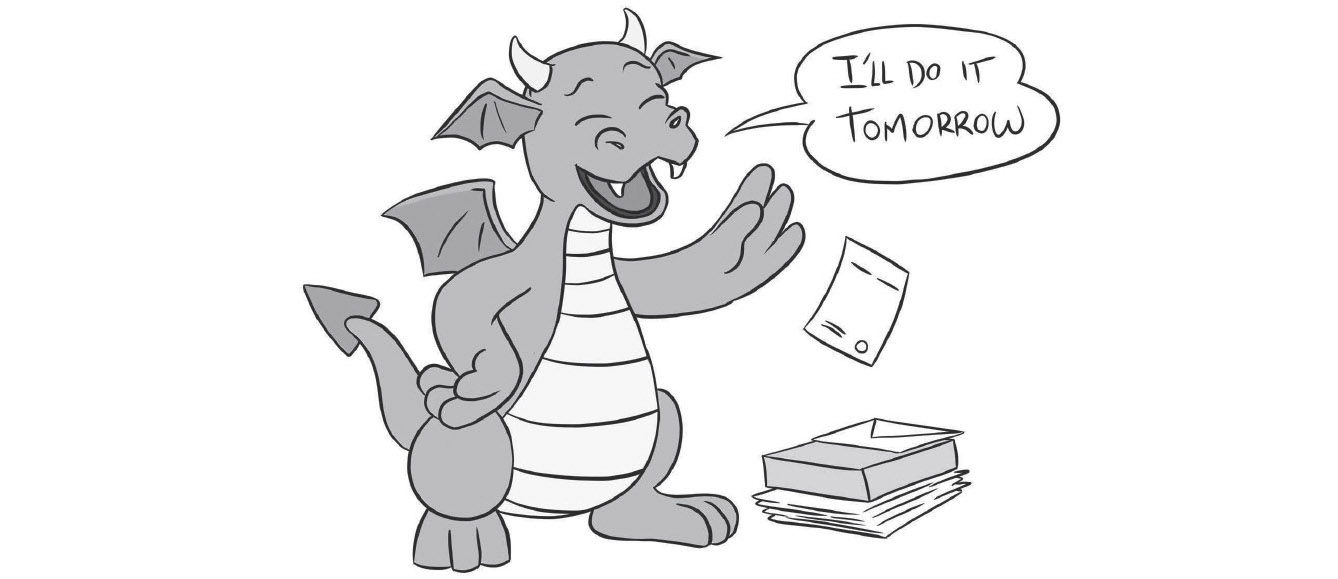PROCRASTINATING (I’LL DO IT TOMORROW) BAD HABIT DRAGONS
Procrastinating (I’ll Do It Tomorrow) Bad Habit Dragons

Procrastination is the act of unnecessarily postponing decisions or actions. When you wait until the very last minute to get things done (completing schoolwork, paperwork, or chores; paying bills; buying birthday, anniversary, or Christmas gifts, etc.), it increases stress and often irritates those around you who feel the need to pick up the loose pieces.
If it isn’t the last minute, this dragon cannot kick its brain into gear to get its work done. Many parents have told me about the constant fights they have with their children or teens about starting projects early and working on them over time, rather than the night before. Many adults have told me they never did term papers in school or they used amphetamines the night before a due date. Procrastination leads to poorly done, incomplete, or unfinished work.
Procrastination is a hallmark of the ADHD Dragon where your Dragon Tamer (PFC) is not as strong as it could be. Procrastination is also associated with abstract goals, depression, perfectionism, never feeling as though you can get something just right, fear of failure, and low energy.
Control the Procrastinating (I’ll Do It Tomorrow) Bad Habit Dragons
- Do you have this habit? Track how many times today you procrastinated or said or thought, “I’ll do it tomorrow.”
- What are the cues or triggers? You are faced with a task or a decision, but you would rather do something else.
- What are the rewards you get? Initial: Don’t have to expend energy and effort; can stay in the present moment; receive immediate gratification rather than future rewards. Rewards without this behavior: Get more done with less stress and do a better job.
- Build a new routine. As with lying, don’t see procrastination as a character problem but rather as a problem to solve. The secret to stop procrastinating is to have a method to get things done. I use one that is just a few simple steps:
Know what you want: Most things in my life start with that question. What are your goals? Write them down and look at them every day. Make sure you create the One Page Miracle on pages 258-259. The first things I look at each day are my One Page Miracle and my to-do and stop-doing lists. Don’t try to do too many things at once or little will get done, which is why I also have a stop-doing list. Tim Cook, CEO of Apple, says, “We say no to good ideas every day. We do this to make great ideas happen.”[1]
Have a one- to three-minute huddle with yourself at the beginning of every day. At Amen Clinics, one of our habits is a daily huddle, where the teams meet for a few minutes each morning to review what happened the day before and what our goals are for the day, all in the context of our overall goals. The huddles keep us in a rhythm of getting things done. Having a brief huddle with yourself will significantly increase your productivity. Decide what you want to accomplish that day in the overall context of your life. Write down three things you want to accomplish that day, and start with the most important one.
Do the most important things first. There’s a reason dessert is at the end of the meal. If you eat it first, you won’t get the nutrition you need. Stop eating dessert first with your time —get the most important tasks of the day done when your energy is highest.
Do the fewest activities to reach your goal. Achieving your goals is like trying to move a giant rock. It’s not a question of effort but of having the right tools and plan. What tools do you need to get the task done? The right food, exercise clothes, financial tracking tools? Make sure you have those before you expend effort. For example, I schedule exercise rather than leave it up to “when I have time.” If I schedule it, no one can take it from me. I also put my walking clothes out the night before so they are ready to go in the morning, and I wear a Fitbit to make sure I am constantly reminded to get enough exercise. Just putting on my watch nudges me to exercise.
Bundle things you love to do with things you tend to procrastinate about. For example, listen to podcasts or audiobooks while exercising, or watch your favorite television show while doing household chores. Most mornings, as I am walking, I’m also on a conference call with two of my work teams.
Give yourself a reward. Tell yourself that after you finish a difficult task, you’ll reward yourself with something special, such as a new book, a warm bath, or a cup of hot tea.
If you find you cannot stop procrastinating using these simple steps, make sure you do not have ADHD interfering with your life. See page 256.
New Routine: The secret to stop procrastinating is to have a method to get things done.